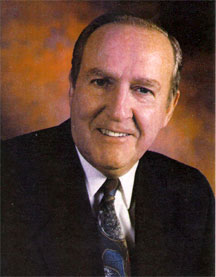
FGF E-Package
The Birch Log
April 10, 2014
NATO, A Subsidiary of the United Nations
by John F. McManus
fitzgerald griffin foundation

APPLETON, WI — NATO was sold to the American people and the U.S. Congress in 1949 as an alliance needed to prevent the Soviet Union from gobbling up more nations to its West. With such an attitude prevailing, the North Atlantic Treaty Organization won ratification in the Senate with only 13 negative votes.
Opponents of entangling the U.S. in additional international pacts claimed correctly that membership in NATO would require U.S. involvement in disputes all over the world. Only a few knew that NATO was created as a "Regional Arrangement" authorized by Articles 51-54 of the United Nations Charter.
Then-Secretary of State Dean Acheson didn't attempt to hide this relationship and, in his March 19, 1949 speech to the U.S. Senate, he confidently proclaimed, "… it is designed to fit precisely into the framework of the United Nations" and is "an essential measure for strengthening the United Nations."
The text of the very brief NATO Treaty, only 14 brief articles, actually mentions "the United Nations" five times.
In 1950, membership in NATO was cited by President Truman as his authority to send American forces into Korea to counter North Korea's invasion of its southern neighbor. The treaty's Article 5 pledges all signers to consider an attack on any member nation as an attack on all that must be met by all with a military response.
In 1950, membership in NATO was cited by President Truman as his authority to send American forces into Korea to counter North Korea's invasion of its southern neighbor.
Later, the precedents established by NATO led to creation of a virtually identical treaty known as the Southeast Asia Treaty Organization (SEATO). President Lyndon Johnson pointed to it for authority to commit hundreds of thousands of U.S. forces to Vietnam.
The two wars were the first waged by the United States without victory. And NATO is now the overall leader of the military action in Afghanistan where victory is seemingly impossible.
NATO has recently raised its voice in response to Russia's annexation of the Crimean area of Ukraine, and to the further stationing by Russia of tens of thousands of troops near the Ukraine-Russia border. NATO Secretary General Anders Fogh Rasmussen says that the Russian actions have "undermined the very foundations" of the relationship that NATO has been building with Russia.
NATO is now the overall leader of the military action in Afghanistan where victory is seemingly impossible. U.S. Secretary of State John Kerry joined with officials of other NATO member nations in planning to build up air, sea and land forces for possible use in reversing Russia's moves.
Should force be employed against Russia, one can be certain that its main ingredient will consist of U.S. military might. But such a development is extremely unlikely inasmuch as it would have to stem from authorization supplied by the U.N. Security Council where Russia possesses a veto.
Seemingly lost in all of this headline-grabbing activity is the fact that the people in Crimea have already approved being annexed by Russia. At most, the situation involves only the two neighbors, Ukraine and Russia. In years gone by, such a low-level problem would involve only those affected by it.
Now, thanks to the United Nations and its NATO subsidiary, any such dispute seems poised become a regional or even a world conflagration. U.N. and NATO leaders seem desirous of injecting their organizations and their forces. And, if they succeed, existing treaty obligations will require the U.S. to participate, even lead the response.
All of which points to reasons why the United States should withdraw from NATO and its parent, the United Nations. Doing so would terminate the ongoing U.S. policy that has American forces acting as the policemen of the world. And respect for the United States would begin to rise again to heights previously enjoyed when our nation minded its own business.
The Birch Log is copyright © 2014 by John F. McManus. All rights reserved.
John F. McManus is President of The John Birch Society.
See a complete biographical sketch.
To subscribe or donate to the FGF E-Package online or send a check to:
P.O. Box 1383
Vienna, VA 22183
© 2014 Fitzgerald Griffin Foundation